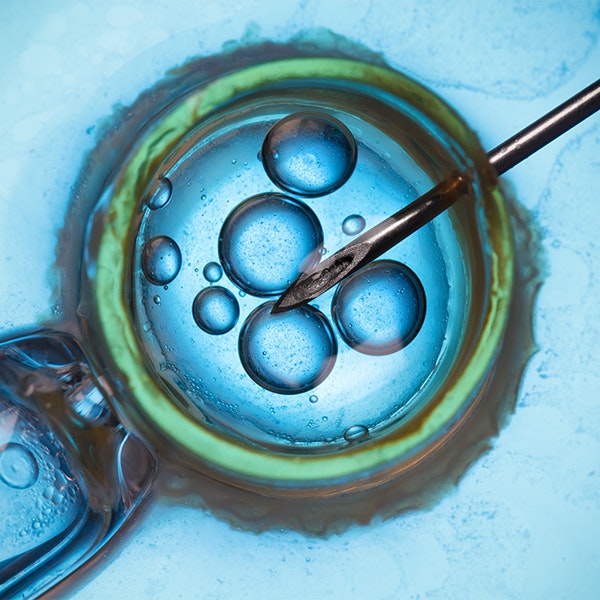Male Infertility Treatment in Houston, TX
Fertility is often closely monitored, widely tested, and treated in women. But what happens when male infertility is the issue?
Male infertility is more common than you think, with 40 to 50% of infertility caused by male-related factors. Fortunately, treatments exist.
The Houston Fertility Center in Houston, TX, uses advanced solutions to help men achieve fertility and grow their families.
What Is Male Infertility?
The World Health Organization defines male infertility as "the inability of a male to make a fertile female pregnant for a minimum of at least 1 year of regular unprotected intercourse." Male infertility is the sole contributing factor of infertility in about 20% of couples struggling to conceive. It is also a contributing factor in about 30% to 40% of all infertility cases.
If you and your partner have been trying to conceive for a year or more and have been unsuccessful, Dr. Sonja B. Kristiansen, our Houston fertility specialist, can look at both male and female aspects of fertility to determine the root cause in order to develop a custom treatment plan to give you the best chance of success.
Understanding the Male Reproductive System and How It Relates to Male Infertility

The male reproductive system is complex. Any number of issues can cause male infertility. The testes produce testosterone, which stimulates sperm production. Infertile sperm matures within the epididymis. During intercourse, the sperm travel from the epididymis through the vas deferens and to the seminal vesicles. There, a sugar-rich fluid provides the sperm with energy and aids in motility. This fluid is the primary component in male ejaculate.
Exploring the Medical Causes of Male Infertility
While the most common type of male infertility is idiopathic, meaning the cause is unknown, the condition may also be due to specific disorders. In particular, male-factor infertility can be caused by:
- Gonad disorder
- Sperm transport disorder
- A disorder of the pituitary gland or hypothalamus
Male Fertility: What You Should Know
Common Factors That Affect Male Fertility
- Tobacco use
- Excessive alcohol consumption
- Obesity
- Erectile dysfunction
- Toxin exposure
- Issues with the testicles, including trauma or overheating
- A prior vasectomy
- Family history of fertility issues
- Certain medical conditions or diseases
- Cancer treatments, such as radiation or chemotherapy
If You Have a Fertility Issue, You're Not Alone Request a consultation to get started on a treatment plan
Have you and your partner been struggling to conceive, and you suspect male infertility may play a role? Millions of couples have found themselves in this same position. Houston Fertility Center is here to help patients identify these issues, provide treatment, and increase their chances of a successful pregnancy. An evaluation can help us provide a diagnosis and guide our fertility specialist, Dr. Sonja B. Kristiansen, in developing a custom treatment plan to help you achieve your dreams of expanding your family. Request a consultation today by contacting our Houston, TX, clinic online or calling us at:

"Best Fertility Clinic" A 5-Star Review from a Houston, TX, Patient
"Best Fertility clinic, they are caring and love what they do. I did 4 rounds of IVF 3 being successful. And we did 1 round with a surrogate and we got twins. Blanca, Mayra and Melissa are the sweetest and love what they do. Dr. K is such a great doctor. I can't thank them enough for helping us build our family, we are so grateful for what they do.I would highly recommend if you are trying to start a family."
Deyanira M.
Low Sperm Count Can Cause Fertility Issues
Low sperm count is one of the main causes of male infertility. It can be caused by factors such as genetics, environment, and lifestyle, among others. Our doctor can find the cause of your low sperm count and determine the best course of treatment.


Medical Conditions That Can Cause Male Infertility
The following medical conditions can cause issues within the male reproductive system.
- Cancer
- Chlamydia, Gonorrhea, or HIV
- Diabetes
- High Blood Pressure
- Cystic Fibrosis
- Mumps
- Genetic Defects
- Depression
"We definitely recommend Houston Fertility Center."
"Dr. Kristiansen and all the staff are great. We will always be thankful to Dr. Kristiansen, Blanca, Melissa and especially Mayra they are all amazing, they helped us with our thousand questions and doubts and when we felt discouraged they kept our spirits up. Thanks to them we are now expecting our precious baby girl. We definitely recommend Houston Fertility Center."
Diana B.
Steroid, Drug, and Alcohol Use:
Their Relationship to Infertility
Recreational drugs such as marijuana, LSD, methamphetamine, and cocaine, as well as steroid use, can impact male and female fertility. Alcohol and tobacco use have also been linked to a decrease in fertility in both men and women. In men, drugs and steroids can impact libido and sperm count, as well as affect testosterone levels (either increasing or decreasing them to levels that impact fertility). This can greatly impact your chances of becoming pregnant.
In some cases, these effects can be reversed by ceasing tobacco, alcohol, drug, or steroid use. This is more likely in short-term users, whereas long-term use can potentially cause lasting harm to your health and fertility. If you are a regular user of drugs, alcohol, steroids, or tobacco, it can lead to fertility-related complications such as testicular shrinkage, as well as whole-body health concerns.
Ceasing all steroids, drugs, tobacco, and alcohol is not only best for your overall health, but especially important when trying to overcome infertility. If you are undergoing fertility treatment at our Houston clinic, it is also very important to let your fertility specialist know of and past or present usage so they can accurately diagnose and treat your fertility concerns. Our team does not judge—our priority is helping you safely and effectively grow your family.
Having Trouble Conceiving? Request a Consultation to Gain Clarity
Infertility affects millions of women and men around the world, but reproductive treatment can help. Finding a solution to your problem begins with identifying the cause. At the Houston Fertility Center, we are committed to helping patients overcome infertility with advanced testing and treatments performed by a highly skilled team. Request a consultation with Dr. Sonja B. Kristiansen to begin treating your fertility issues. Contact us online or call us at:
(713) 225-5375

"Highly Recommended"
"I love this place and Dr. K has a high success rate. This is why I initially went to her clinic. They don’t treat you like a business but it’s very personal. I was successful on my first IVF attempt and had a healthy baby girl. I will be using her for my next baby when I’m able. Highly recommended."
Vicky M.
When Should I See a Doctor for Male Infertility?
There are several reasons to seek help for suspected male infertility, and they can vary by patient. The causes of male infertility are often beyond your control, but our Houston fertility specialist can help identify any issues and offer treatment options to increase your chances of a successful pregnancy.

Lack of Pregnancy
Visit our fertility doctor if you and your partner are younger than 35 and have been trying to get pregnant for a year without success. You can also visit our fertility practice if you or your partner are over 35 years old and have been trying for six months.

Existing Concerns
If you have already identified issues that may prevent you from becoming pregnant, such as prior chemotherapy or an injury, contact our Houston fertility clinic so we can help. Please bring any relevant medical documentation you may have to help with the process.

Previous Fertility Issues
Some patients have already identified male infertility. Patients who have had to undergo prior fertility treatment in order to get pregnant can contact our Houston fertility clinic so we can help them on their subsequent journeys to expand their families.
The Treatment Process for Male Infertility
With over 20 years of experience helping patients increase their chances of conception, Dr. Kristiansen can provide compassionate and thorough diagnosis and treatment for male infertility.
Ready to Start Your Journey? Get in touch for a consultation at Houston Fertility Center
At the Houston Fertility Center, we understand that the journey to pregnancy can be emotionally taxing, and many patients often shoulder the blame. It is important to remember that most fertility issues are beyond your control, and experiencing male infertility doesn't mean hope is lost.
Advances in reproductive medicine mean we can help more patients than ever increase their chances of a successful pregnancy. Identifying the issue is the first step in the journey. We are here to guide you every step of the way.
Start your journey to growing your family by completing our online form or by calling us at:

"Y’all made our dreams come true."
"I Definitely want to thank Houston Fertility clinic. Y’all made our dreams come true. I couldn’t thank y’all enough we are obsessed with our baby girl. Anyone who is trying to conceive, I would defiantly recommend them." Dave B.
Our Available Treatment Options For Male Infertility
When a patient is diagnosed with male-factor infertility, several treatment options are available to address the issue. Of course, the recommended treatment will depend on the specific cause of male infertility.
Fertility Supplements
Low sperm production caused by retrograde ejaculation, a reversed vasectomy, and other factors may be improved with male fertility supplements, which can be purchased in most health food stores. This treatment method is often combined with more extensive treatments to yield better results.
Artificial Insemination
If low sperm count is to blame for your reproductive challenges, artificial insemination, otherwise known as intracytoplasmic sperm injection, can be beneficial. During this process, sperm is collected from multiple semen samples. Once obtained, they can be delivered directly to your partner's fallopian tubes or uterus.
In Vitro Fertilization (IVF)
Another treatment option for low sperm count is IVF. This treatment involves harvesting eggs from the female and collecting sperm from the male. The eggs are then fertilized with the sperm in a laboratory setting. After a few days, the resulting embryos are implanted directly into the woman’s uterus.
INVOcell
INVOcell is an alternative practice similar to IVF. The INVOcell is a small device that holds the sperm and egg. It is placed inside the vagina for a short incubation period of a few days. The fertilization period occurs within the INVOcell instead of in a laboratory setting.
Donor Sperm
If there is zero sperm production, also known as azoospermia, then donor sperm can be used. These sperm are collected from a trusted sperm bank and delivered to the woman’s fallopian tubes or uterus with intracytoplasmic sperm injection.
Reducing Your Risk of Infertility
In general, there is no way to prevent male infertility caused by genetic issues or disease. However, there are several ways to promote healthy sperm production and increase fertility.
- Consume alcohol in moderation
- Protect yourself against STDs
- Avoid overheating the testicles (hot baths, saunas, or Jacuzzis)
- Wear loose-fitting underwear
- Avoid exposure to toxic chemicals and radiation
- Practice good hygiene
- Exercise and eat a well-balanced diet
- Avoid tobacco products
"I Love This Place" More 5-Star Reviews from Houston, TX, Patients
"I love this place the nurses definitely put alot of definition into this clinic. Without them and their kindness I probably wouldn't have made it mentally. Anytime I had a question they answered whether through phone call or email. It was the best!.. Thank you to Blanca and Mayra for making this the best experience for me! I'll be seeing yall again in another year or 2. ❤️"
Celeste G.
Take the First Step Request a consultation today
No one wants to hear that they have fertility issues. We understand just how emotional this journey can be, and we are here to help every step of the way. Advancements in reproductive technology are allowing doctors to help more patients than ever overcome the obstacle of infertility and achieve their dreams of parenthood.
The first step of the journey is a consultation with our skilled fertility specialist, Dr. Kristiansen. Request an appointment by filling out our online form or by calling our office in Houston, TX, today:

The Cost of Treating Male Infertility
Insurance Coverage and Affordability
Some types of insurance will help to cover the cost of fertility treatment. We work with most major insurance providers, which can help reduce any out-of-pocket costs. Our Houston office provides low standard pricing and discounted packages and bundles to help patients get the treatment they need to increase their odds of a successful pregnancy.
The best way to get an accurate quote is through a consultation with Dr. Kristiansen. She can develop a custom treatment plan and explain the specific costs involved.
Frequently Asked Questions About Male Infertility
Q. Can male infertility be prevented?
A. In some cases, yes. However, if you have a congenital or medical issue that is causing your infertility, these are often unavoidable. For other cases, following our tips above, like proper hygiene, protection against STDs, etc., you can reduce your risk of developing male factor infertility. If you use tobacco, alcohol, drugs, or steroids, it is also advised that you stop, as it can impact your fertility and cause long-term damage that can impact your future fertility.
Q. Can hot tubs cause male infertility?
A. Hot tubs increase the temperature of the testes, which can lower sperm production. If you are trying to conceive, it is best to avoid hot tubs, especially if you already have a low sperm count. Sauna use and tight underwear can also cause the testes to overheat, thus lowering sperm production. When trying to conceive, it is best to minimize or avoid hot tub or sauna use and wear loose-fitting underwear and pants to prevent the testes from overheating.
Q. Will a vasectomy reversal solve my infertility?
A. Vasectomy reversals are successful about 60%-95% of the time. However, a reversal is not a guarantee that you will be able to get your partner pregnant, even if the reversal is a success. There are a number of factors that must be considered, including how long it has been since your vasectomy, the health of you and your partner, and more. It is best to consider a vasectomy as a long-term or permanent procedure. If you are uncertain, fertility preservation methods such as sperm freezing can be considered, as sperm can later be used in IVF or IUI should you change your mind about having more children later.
Q. How does a semen analysis determine male factor infertility?
A. During a semen analysis, your doctor will look at the quality and quantity of the sperm in your semen. Things your doctor will look for include the absence of sperm, the quantity of sperm, the shape of the sperm, and how the sperm are moving. However, semen analysis is not always the sole determining factor in regard to male infertility. Other factors will be examined and analyzed when diagnosing and treating male infertility.
Q. How does sperm motility impact fertility?
A. If a sperm is unable to move toward the egg, then the egg cannot be fertilized. This could be slow-moving sperm or even sperm that move in circles. Your doctor will examine how your sperm are moving. A few odd swimmers are usually not a cause for concern, but if a large number have an issue, this may be the cause of your fertility issues. In some cases, IVF with intracytoplasmic sperm injection (ICSI) may be a good option to overcome motility issues impacting fertility.
A Glowing Review From One of Our Houston Patients
"Thank you again this amazing office for all that you do and did to help me and my husband! If your considering it, I highly recommend you set up a consultation you won’t regret it. And in fact you’ll see why so many people choose this office. I will be back to expand our family once our son is about a year old :)
Andreana U.


